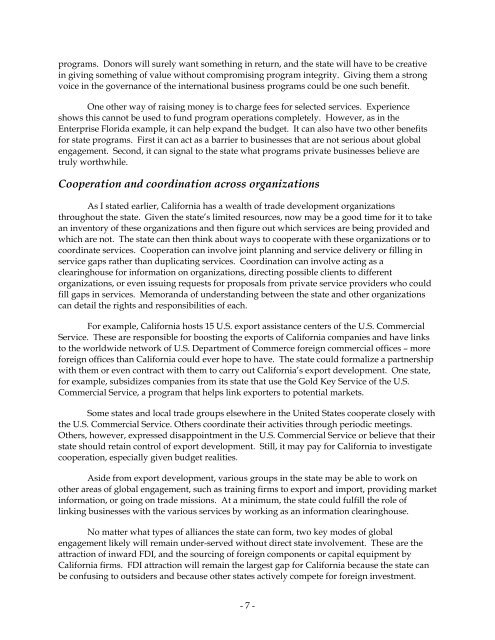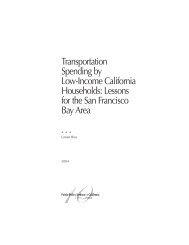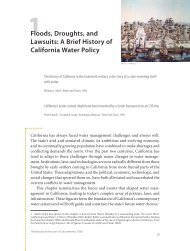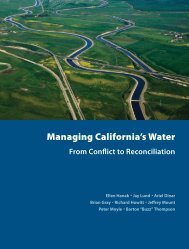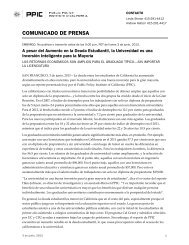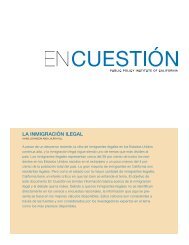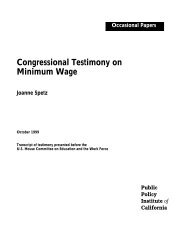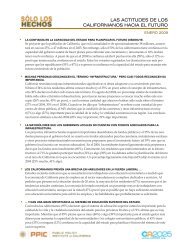Occasional Paper Title - Public Policy Institute of California
Occasional Paper Title - Public Policy Institute of California
Occasional Paper Title - Public Policy Institute of California
You also want an ePaper? Increase the reach of your titles
YUMPU automatically turns print PDFs into web optimized ePapers that Google loves.
programs. Donors will surely want something in return, and the state will have to be creative<br />
in giving something <strong>of</strong> value without compromising program integrity. Giving them a strong<br />
voice in the governance <strong>of</strong> the international business programs could be one such benefit.<br />
One other way <strong>of</strong> raising money is to charge fees for selected services. Experience<br />
shows this cannot be used to fund program operations completely. However, as in the<br />
Enterprise Florida example, it can help expand the budget. It can also have two other benefits<br />
for state programs. First it can act as a barrier to businesses that are not serious about global<br />
engagement. Second, it can signal to the state what programs private businesses believe are<br />
truly worthwhile.<br />
Cooperation and coordination across organizations<br />
As I stated earlier, <strong>California</strong> has a wealth <strong>of</strong> trade development organizations<br />
throughout the state. Given the state’s limited resources, now may be a good time for it to take<br />
an inventory <strong>of</strong> these organizations and then figure out which services are being provided and<br />
which are not. The state can then think about ways to cooperate with these organizations or to<br />
coordinate services. Cooperation can involve joint planning and service delivery or filling in<br />
service gaps rather than duplicating services. Coordination can involve acting as a<br />
clearinghouse for information on organizations, directing possible clients to different<br />
organizations, or even issuing requests for proposals from private service providers who could<br />
fill gaps in services. Memoranda <strong>of</strong> understanding between the state and other organizations<br />
can detail the rights and responsibilities <strong>of</strong> each.<br />
For example, <strong>California</strong> hosts 15 U.S. export assistance centers <strong>of</strong> the U.S. Commercial<br />
Service. These are responsible for boosting the exports <strong>of</strong> <strong>California</strong> companies and have links<br />
to the worldwide network <strong>of</strong> U.S. Department <strong>of</strong> Commerce foreign commercial <strong>of</strong>fices – more<br />
foreign <strong>of</strong>fices than <strong>California</strong> could ever hope to have. The state could formalize a partnership<br />
with them or even contract with them to carry out <strong>California</strong>’s export development. One state,<br />
for example, subsidizes companies from its state that use the Gold Key Service <strong>of</strong> the U.S.<br />
Commercial Service, a program that helps link exporters to potential markets.<br />
Some states and local trade groups elsewhere in the United States cooperate closely with<br />
the U.S. Commercial Service. Others coordinate their activities through periodic meetings.<br />
Others, however, expressed disappointment in the U.S. Commercial Service or believe that their<br />
state should retain control <strong>of</strong> export development. Still, it may pay for <strong>California</strong> to investigate<br />
cooperation, especially given budget realities.<br />
Aside from export development, various groups in the state may be able to work on<br />
other areas <strong>of</strong> global engagement, such as training firms to export and import, providing market<br />
information, or going on trade missions. At a minimum, the state could fulfill the role <strong>of</strong><br />
linking businesses with the various services by working as an information clearinghouse.<br />
No matter what types <strong>of</strong> alliances the state can form, two key modes <strong>of</strong> global<br />
engagement likely will remain under-served without direct state involvement. These are the<br />
attraction <strong>of</strong> inward FDI, and the sourcing <strong>of</strong> foreign components or capital equipment by<br />
<strong>California</strong> firms. FDI attraction will remain the largest gap for <strong>California</strong> because the state can<br />
be confusing to outsiders and because other states actively compete for foreign investment.<br />
- 7 -


